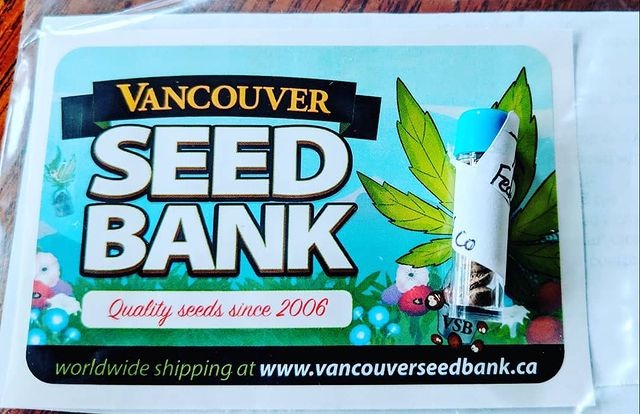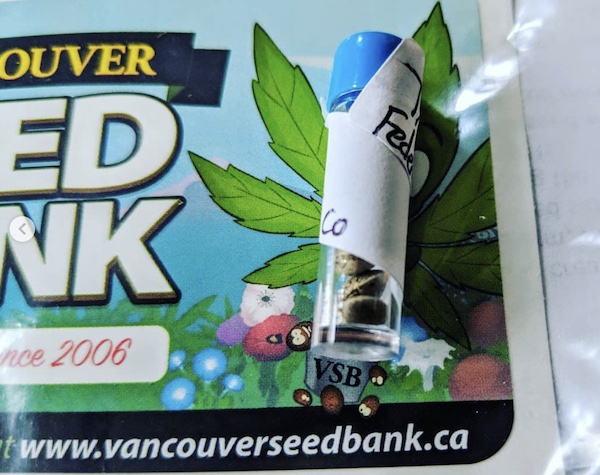Vancouver Seed Bank Review – Best Seed Bank in Canada
Vancouver Seed Bank Review
 Vancouver Seed Bank is widely regarded the best online seed bank in Canada. In terms of location, isolation and preservation, the facility is cutting edge for a national seed bank. Seed banks throughout the country also benefit from this success, with more than 20 having closed or relocated in the past ten years. If you’re looking for a seed bank near you, a good first stop might be the BC Seed Bank Alliance (BCSBAA). Since 1996, the BCSBAA has worked with the Seed Safe Council (SSC), the Cooperative Seed Growers of Canada (CGS), and the Organic Seed Growers of BC (OSGC). Together, these three organizations have provided a standard of excellence that has kept many seed banks around the country alive. But these resources are limited, and the current amount of organic and heirloom seed available for sale to customers is not large.
Vancouver Seed Bank is widely regarded the best online seed bank in Canada. In terms of location, isolation and preservation, the facility is cutting edge for a national seed bank. Seed banks throughout the country also benefit from this success, with more than 20 having closed or relocated in the past ten years. If you’re looking for a seed bank near you, a good first stop might be the BC Seed Bank Alliance (BCSBAA). Since 1996, the BCSBAA has worked with the Seed Safe Council (SSC), the Cooperative Seed Growers of Canada (CGS), and the Organic Seed Growers of BC (OSGC). Together, these three organizations have provided a standard of excellence that has kept many seed banks around the country alive. But these resources are limited, and the current amount of organic and heirloom seed available for sale to customers is not large.
In fact, Vancouver Seed Bank is perhaps best known because of the efforts of some of its volunteers, who go by the name Seed Savers. Seed Savers helps preserve and promote the seed diversity that was once widespread in this country, and now exists in a fraction of its former number. They say saving seed is part of a process that helps ensure our food supply and environment won’t be diminished.
According to Vancouver Seed Bank, the right seed is the foundation of any growing or seed-saving operation. And the right seed for your crop depends on three factors: the genetic merit of the plant; its growing and storage environment; and, if and how the crop will be propagated. The primary focus should be on a method of plant breeding called hybridization, which introduces species that have desirable characteristics into the mix of varieties.
 If you’re a gardener, your principal concern is a plant with true genetic merit. Heirloom seeds are not necessarily the best plants, but they are the most unique, and the most likely to thrive in your garden. Even more importantly, when you collect heirloom seeds, you’re saving the wild relatives of today’s commonly cultivated plants. In a free society, it is our duty to ensure that future generations have access to healthy, high-quality food. And Vancouver Seed Bank believes that this duty extends to preserving heirloom varieties from our past.
If you’re a gardener, your principal concern is a plant with true genetic merit. Heirloom seeds are not necessarily the best plants, but they are the most unique, and the most likely to thrive in your garden. Even more importantly, when you collect heirloom seeds, you’re saving the wild relatives of today’s commonly cultivated plants. In a free society, it is our duty to ensure that future generations have access to healthy, high-quality food. And Vancouver Seed Bank believes that this duty extends to preserving heirloom varieties from our past.
The bank’s primary motivation for saving seeds is providing healthy, organic food for future generations.
An important question is, how do you identify high-quality heirloom seeds? Depending on the climate you live in, you may have an easy time finding heirloom varieties in the grocery store or at your local farmer’s market. But finding varieties that thrive in your area and growing conditions is much more difficult. Seed saving is the bank’s answer to this challenge. It is seed collecting, foraging and gardening-based.
Unlike most seed banks, it seeks varieties that grow naturally and are adapted to our growing conditions. It makes a point of telling people where they can find these plants, including “wild food sources.” If the seeds are native and a garden-source variety, they’re likely to be wild, so if you collect them, always remember to check the catalogue for more information. The banks does its best to make sure that the seeds it collects are clean and verifiable. If it finds seeds with a contamination issue, it’ll keep the seeds from other seeds, but it’ll do its best to prevent contamination in the future.
Seeds come from both wild and agricultural sources. Plant seeds are the foundation of seed-saving. But as Vancouver Seed Bank grows more plants genetically, it also has a greater responsibility to clean up its seeds. It’s not enough to take care of the seeds it collects; rather, the bank believes that we to make sure that the others don’t contaminate them. This is especially important for food crops that are easily cross-pollinated, such as corn. Good seed cleanliness can be demonstrated by germination testing and seed check, both of which can be found in the on the company website.
Most people don’t have the time to spend hours in the garden gathering and segregating seeds from different plants. The bank has made it easy for you by selecting cultivars from three of the most frequently available hybrid seed lines. These selections are hybridized for an adequate hardiness in Canada and the US, a heat tolerance, early maturity, and yield. Some of its selections are well-known, and a few are seed worthy but not yet grown commercially.

The seed bank is quite clear about its seed needs. The costs listed on their website are what customers should expect:
Between $3 and $10 per seed, based on the size of the seedlings.
“We also accept seed orders that fall into our “other” category (much smaller quantities), including those that contain particularly rare, hard-to-find, or niche crops or cultivars. We will price these accordingly.”
According to the seed bank, the prices vary depending on how it obtains your seed, so be sure to ask. The seed bank provides a wide variety of heirloom seeds, as well as rare and unusual vegetables.
Moreover, customers worried about their purchases would do well to consider that the quality of the seeds from Vancouver seed bank are evidenced by the nature of seed banking in Canada. Seed banking in Canada is not like banking with a credit card. With the exception of a small bank in Vancouver, seed banks in Canada have to pay someone else to store their seed for them. The cost to store seed is fairly expensive, but it’s not the only cost, and it’s not the most difficult cost. There are other costs to consider, such as shipping, storing your seeds, and “special handling.”
Many Canadian banks won’t accept certain kinds of seeds as payment. While most banks will accept non-US seed, some won’t take seed from countries other than the US, including Canada, the UK, Australia, and New Zealand. And, as with the tax issue, check with your credit card company if you’re considering this option.
Comments are closed.